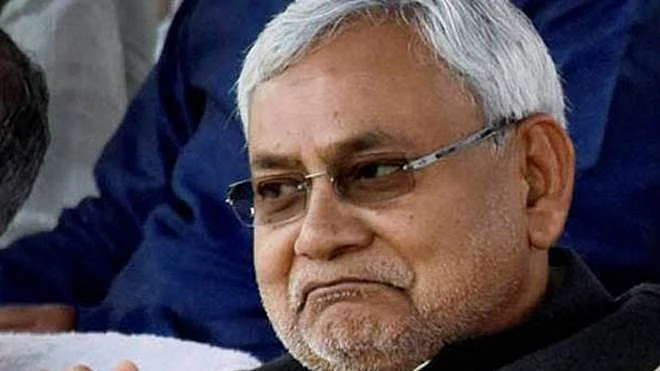BJP forces Nitish Kumar to concede Speaker’s chair in Bihar Assembly
Learning from their experience in Karnataka and Madhya Pradesh and from RJD’s experience in Bihar in 2017, BJP got its own man, an upper caste MLA, elected as Speaker on Wednesday

Vinay Kumar Sinha managed to get elected on Wednesday by voice vote as the new speaker of the Bihar assembly. The election was marred by high drama which included a heated exchange of words between Pro Tem Speaker Jitan Ram Manjhi and Tejashwi Yadav, leader of the largest party in the Bihar assembly.
The purported call made from jail by RJD supremo Lalu Prasad from inside the prison to poach a BJP MLA and cajole the MLA to abstain during the voting also made the election dramatic.
The MLA allegedly contacted by Lalu Yadav from jail belonged to the Sushil Modi faction of the Bihar BJP and as Modi Jr is said to be unhappy with the treatment meted out to him, the RJD veteran is said to have considered him easy prey for defection. Sushil Modi, on his part cried foul and thereby proved his loyalty to the BJP and the ruling alliance.
By taking the extraordinary decision to field his own candidate for the election, Tejashwi Yadav made his intentions clear. He would not sit by and allow the NDA government with a fragile majority a smooth sailing. Having been deprived of all the important posts including the all-important post of the Speaker, Dalit MLAs are said to be upset.
The complete marginalisation of the three decade old power trio in the BJP, comprising Sushil Modi, Prem Kumar and Nand Kishore Yadav, Dalits were hopeful of getting the post of either Dy CM or Speaker of the assembly.
Even as counting of votes was in progress on 10 November, a vocal section pushed the name of Kameshwar Chaupal, the Dalit leader who laid the foundation brick for Ram Temple in Ayodhya. According to Bihar watchers, Pro Tem Speaker Jitan Ram Manjhi could have emerged as the consensus choice for the post of regular speaker as Mahagatbandhan too would not have been averse to having Manjhi as the Speaker.
Contrary to speculation that Nand Kishore Yadav would be named as the Speaker, BJP went for Vinay Kumar Sinha, a Bhumihar. May be Yadav’s surname went against him as the post of Speaker is going to be crucial in view of the extremely thin majority of the NDA the politically nomadic instincts of HAM leader Jitan Ram Manjhi and VIP chief Mukesh Sahni who together or even separately can pull the rug to destabilise the Nitish Kumar led govt.
Though he has been a minister, Vinay Sinha, like Tarkishore Singh and Renu Devi, the two BJP Deputy CMs, has been a back bencher in the party.
Karnataka and Madhya Pradesh have proved how crucial is the post of the Speaker and as such BJP was determined to get hold of the post. Nitish Kumar, for the first time, was forced to concede the post of Speaker to the alliance partner. Udai Narain Chaudhary, the then JD(U) MLA from Imamganj remained Speaker for 10 long years. Chaudhary has now gone back to RJD.
In 2015 too, when the RJD won more seats than JD(U), Lalu Prasad conceded the post of Speaker to Nitish and Vijay Kumar Chaudhary was made the speaker. Following the parting of ways in 2017, Lalu reportedly repented having conceded the Speaker’s post to Nitish. Wiser by Lalu experience, the BJP this time around was uncompromising when it came to the Speaker’s post.
Going by the social composition of the new power structure of Bihar, the OBCs and upper castes have among themselves distributed the electoral booty. The CM and his two deputies are from the OBC/EBC category. Whereas Nitish and Tarkishore are OBCs, Renu Devi, the other Dy CM is an EBC, a social group specially carved out by Nitish Kumar.
With a Bhumihar as Speaker, the power Circle is now complete. A section of Bihar observers believe that retaining the support of the resourceful and articulate Bhumihar community is crucial for BJP’s future. Through selective voting, the Bhumihars have made it clear that they cannot be taken for granted. Whereas the Bhumihars, by and large voted very enthusiastically, almost aggressively for the BJP, in many constituencies where JD(U) was contesting the seat, they either remained indifferent or voted for other candidates particularly LJP candidates.
Unlike Bhumihars, Dalits mostly supported JD(U) candidates but many of them voted for Mahagatbandhan candidates particularly in the seats contested by the left parties and the RJD. Though more sympathetic towards Nitish, the EBCs by and large supported NDA candidates, the only exception being some constituencies contested by the left parties.
The message for the Dalit voter is that first deserve and then desire. There cannot be free lunch for them in Bihar politics. All eyes are now fixed on the lone Rajya Sabha seat.
It is to be seen if some Dalit leader is nominated to retain the seat that fell vacant on account of Ram Bilas Paswan’s death.
Follow us on: Facebook, Twitter, Google News, Instagram
Join our official telegram channel (@nationalherald) and stay updated with the latest headlines